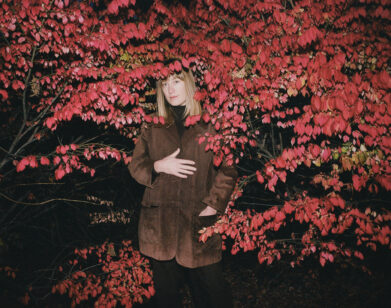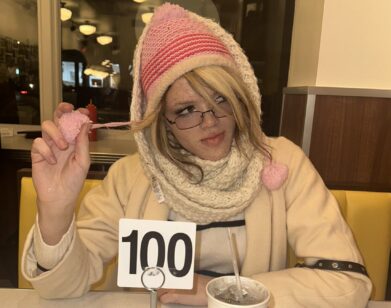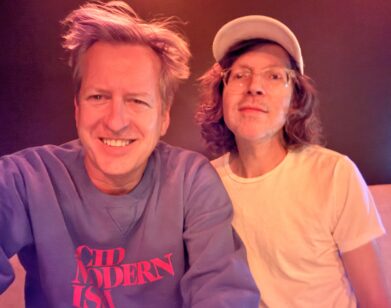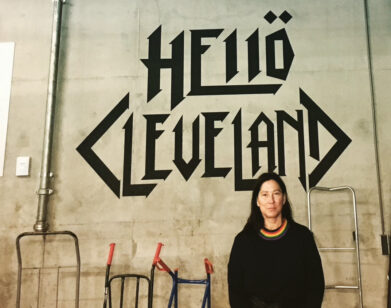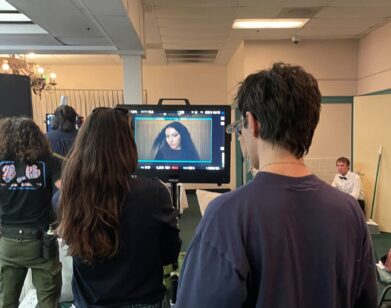Pom Poko
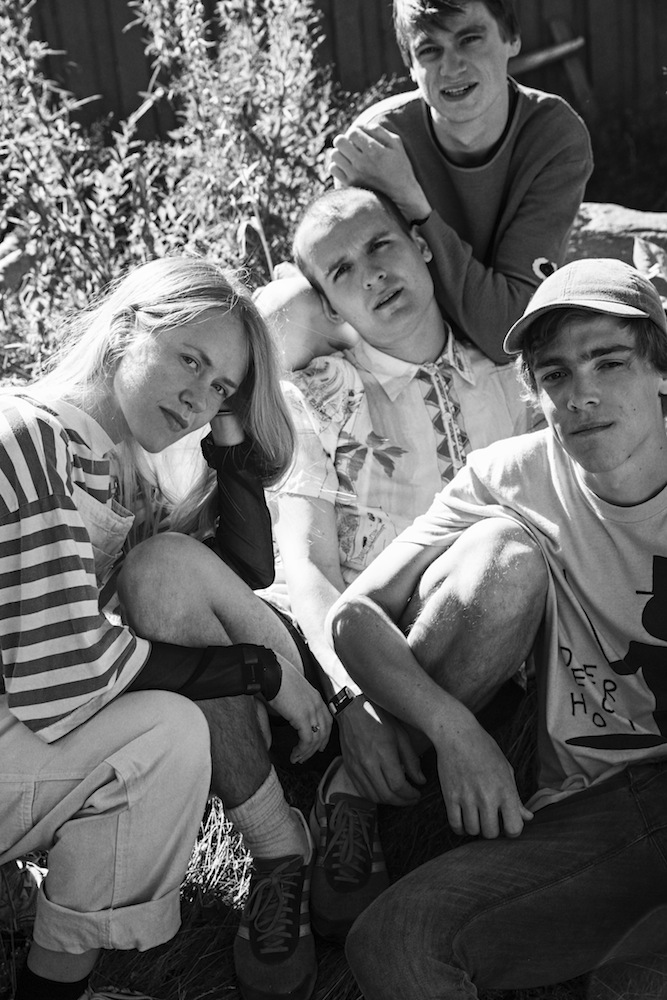
POM POKO IN TØNSBERG, NORWAY AT SLOTTSFJELL FESTIVAL, JULY 2017. FROM LEFT: RAGNHILD FANGEL, MARTIN MIGUEL TONNE, JONAS KRØVEL, AND OLA DJUPVIK. PHOTO: VICTORIA STEVENS.
THE BASICS: Ragnhild Fangel, vocals, 24; Martin Miguel Tonne, guitar, 25; Jonas Krøvel, bass, 24; Ola Djupvik, drums, 23. Based between Oslo and Trondheim, Norway.
AN INTRODUCTION, IN THEIR OWN WORDS: Ola Djupvik: Everyone reacts with, “I thought I was going to hate it, but this was pretty fun.” Mostly people are positively surprised.
Martin Miguel Tonne: Since all of us have studied music to different degrees, jazz music specifically, people often want to talk about that in relation to our music, even though it doesn’t make any sense to link it to jazz music. Lots of interesting words come up when people try to be creative. We’ve had some amazingly dumb descriptions after shows, which are really great.
Jonas Krøvel: But also, one good one, I think, or it was funny, was “groove core.”
Djupvik: We really enjoy people saying, “Oh, yeah, I can hear you listen lots to Le Tigre,” and we’re like, “Sure, why not.” People are always trying to put us in a box.
Tonne: Some people describe it as jazz-punk or something—I don’t think that’s really good.
Ragnhild Fangel: There’s not a lot of jazz in it.
Tonne: There’s not a lot of jazz, but there’s some groove and some core.
Fangel: And some pop.
Tonne: And some punk.
Djupvik: Some African pop music as well, especially when we started a new tune yesterday. Our fundamental ideology is if it’s fun, it’s good. If we think it’s fun to play, and it sounds fun, then it’s good enough. We aren’t too concerned with genre or anything like that; it just turns out to be this strange genre.
IT STARTED IN SEPTEMBER 2016: Tonne: We got a gig, an event gig, at a literature festival. Jonas, our bass player, got it, and they wanted some light jazz music. We had a noise trio, so he asked us, and then he wanted Ragnhild to join on vocals. We wrote lots of songs in a really short period of time, which were not jazzy at all, but noisy punk songs, and then we recorded one of those after the gig. All the literature people left the gig while we were playing. [laughs] But some people stayed, and we went straight to our rehearsal space and recorded a song after that. We had no ambitions or thoughts about what we could become, but some people liked it. We were friends for a long time before we made the band, and we’d all played together separately.
YEAR ONE AS A BAND: Djupvik: It’s like jumping on a running treadmill. I think none of us expected to have any success, because for a long while we maybe didn’t quite consider that we were a pop band. I certainly thought that we were making some experimental stuff, but it turns out we didn’t do that at all. So far it’s been a steep learning curve—really fun though. Hectic but fun.
THE NORDIC INFLUENCE: Fangel: I don’t know if we have a lot of Nordic sound.
Djupvik: If we do, I think we’re a counterpoint to it. We’re all tired of that Nordic, frozen pop sound. It’s certainly not frozen, our music.
Tonne: I don’t think it comes from the nature or anything, but it comes from an understanding that it can be successful to make music with lots of reverb and ice-cold synths with high-pitched girl voices, so that’s happened a lot and it works. You are blonde and it sounds sort of Nordic, or it sounds the way that people from the world think that Nordic music should sound or sounds. Like Ola said, I think that’s a trend that’s gotten out of control. It’s so insanely boring. We want to do something that’s not like that at all, and hopefully that can be a new Nordic thing, to get out of that frozen synth-pop.
PROCESS AND IMPROVISATION: Fangel: We work together. We write everything. We just meet up in our rehearsal space and start something, like a groove. I usually make the melody, Martin makes the guitar chords, and Jonas makes the bass line.
Djupvik: Jonas usually incorporates a dissonant theme or Jonas-produced tune without us knowing, because we’re so focused on what we play. Then Jonas comes up with his own horrible bass line. [all laugh]
Krøvel: My best bass lines are not my own bass lines. I usually steal without changing it.
Djupvik: Our founding tune, the idea that Jonas brought to the first rehearsal was not even vaguely similar, it’s quite similar to a Beatles tune, and it’s called the same as this Beatles tune: “Day Tripper.”
Fangel: It’s quite set, the form of the song, but I improvise a lot of the lyrics on stage. That sometimes works, and sometimes it doesn’t work that good, but people don’t listen to the lyrics anyway—usually. [laughs] We do improvise a little bit.
Djupvik: We’ve established, I think, a healthy room for error. On some shows, I have certainly made catastrophic mistakes, like I started the wrong tune once, but it sort of went okay. It doesn’t have to be perfect. I’m a bit tired of that. That’s part of the Norwegian or Nordic music thing as well, that you have so many tracks and everything is electronic, so it sounds always perfect. But the nerve or the thrill of making mistakes in the whole live thing, I think it’s really, really thrilling to take chances, so you have some energy, some adrenaline.
WHAT’S NEXT: Tonne: We’ll have a single release in early September.
Djupvik: We don’t have a label yet, so we’re kind of our own bosses for now. And we have decided that September is good for us. [laughs]
Tonne: When we started out, it seemed that our goals were accomplished before we managed to understand that we had them, because it went so fast. We put our song on the internet, and then without thinking about it we got some showcase festival stuff and some radio stuff, so it was like, “Oh, yeah, this is cool.” Then stuff kept happening, like, “Woah, okay, we’re going to play that festival. Sure.”
Krøvel: So we had to make songs. We didn’t have songs.
Tonne: Now that we understand that cool things can’t happen if we want to do them, I think we have more specific goals, like we were in the U.K. a couple of months ago and are going back there. We want to play more and bigger shows and release an album or more music—do the same things we’re doing now, except more and bigger.
Krøvel: And play a lot of places in the world, because that’s very fun.
Djupvik: I think also we have aspirations to, if you go to a concert with us, create an experience more than just the music. In the film from which our name is taken, [Pomo Poko (1994),] there’s a great scene where the raccoons shape-shift into making a parade of all sorts of fucked up animals. That’s kind of what I want a concert with us to be like: your ears are packed with incomprehensible stuff and your eyes smell funny. I don’t know. [all laugh]
Fangel: Your eyes smell funny—how?
Djupvik: Like a full body experience.
Tonne: Exhausting.
Djupvik: After seeing that movie, you’re really exhausted. It’s so good.
SOME FINAL WORDS: Tonne: If the question is: Is the music industry underestimating the audience? Then the answer would be yes, that the music business and the media should take people a bit more seriously in terms of what they can understand. Now in Norway it seems like everything is becoming more and more the same, because it works and people like it. All the big channels for hearing new music are giving you the same stuff, but when something different comes through, people often love it.
FOR MORE ON POM POKO AND UPCOMING TOUR DATES, VISIT THE BAND’S WEBSITE.
For more Norwegian acts to know from Slottsfjell Festival 2017, click here.

